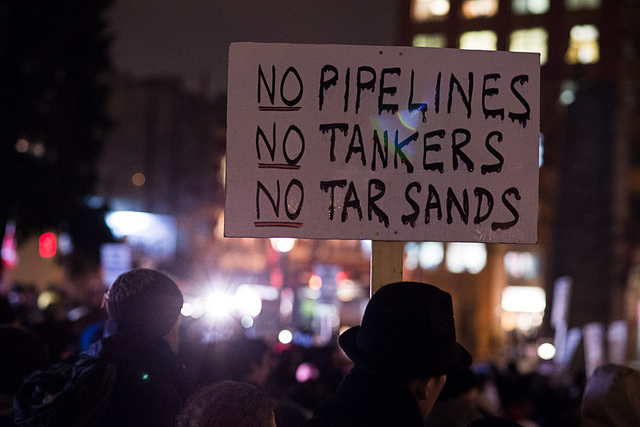rabble is expanding our Parliamentary Bureau and we need your help! Support us on Patreon today!
The heavily criticized Northern Gateway pipeline might have had a final wrench thrown into its development.
In his mandate letters to the ministers of transport, fisheries, natural resources and environment, Prime Minister Justin Trudeau has instructed that they “formalize the moratorium on crude oil tanker traffic on British Columbia’s North Coast.” These areas include the Dixon Entrance, Hecate Strait and Queen Charlotte Sound, effectively blocking the export of crude oil from Enbridge’s proposed pipeline.
In an open letter to Trudeau, 30 environmental, religious and Indigenous organizations expressed their gratitude for his decision.
“With these commitments, you are standing with First Nations, northerners, unions, municipalities, businesses, environmental groups, faith groups and people from across British Columbia and all of Canada that have said the risks of the Northern Gateway project to our ecosystems and economy are simply too great,” writes the organizations. “The Northern Gateway project is emblematic of the broken relationships brought about by a federal government that was not willing to listen, and it is time for that to change.”
The $7-billion Northern Gateway project, which would bring pipelines from Bruderheim, Alberta to Kitimat, B.C., has been controversial since its inception. While it was formally launched in 2004, the Canadian government did not give its approval until June, 2014. This approval was contingent on 209 conditions ranging from a marine mammal protection plan to air quality emissions management to Aboriginal employment reports.
These conditions, however, did not address the concerns of a myriad of environmental and Aboriginal groups that have been protesting the pipeline’s development for several years.
If built, the pipeline would be over 1,150 kilometers long and cross 40 First Nations territories. It also runs the risk of disturbing salmon spawning grounds, the Great Bear Rainforest and other ecologically sensitive areas. Oil spills were an additional concern as the project would have led to an increase in tanker traffic on the West Coast by more than 220 trips per year — if Trudeau hadn’t mandated a ban on this tanker traffic.
“Without tankers crude oil has no place to go, that means no pipelines, no oil trains moving tar sands to the northern B.C. coast,” said Karen Mahon, ForestEthics Advocacy director in a statement.
This crucial mandate comes in the wake of President Obama’s shutdown of the Keystone XL pipeline project earlier this month. Both of these decisions are significant with COP21 now underway.
“We are living the tipping point on climate disruption,” says Mahon. “The whole world is heading to Paris…to come up with a plan to fight climate change. This is the beginning of the end for the dirtiest crude oil on Earth.”
Alyse is a Vancouver-based writer and editor with a passion for social justice, storytelling and tea. She studied English Literature and Global Development at Queen’s University and believes in the ability to make positive changes through media that digs deep, asks questions and shares narratives. Alyse was the Editor of Servants Quarters and has written for the Queen’s News Centre, Quietly Media and the Vancouver Observer.
Photo: flickr/ travis blanston



